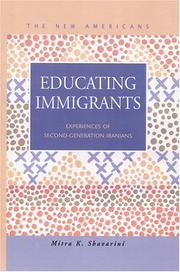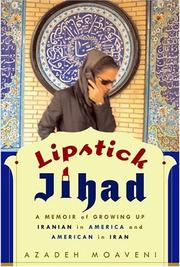| Listing 1 - 10 of 17 | << page >> |
Sort by
|
Book
ISBN: 0773417893 9780773417892 9780773440814 077344081X Year: 2013 Publisher: Lewiston, New York
Abstract | Keywords | Export | Availability | Bookmark
 Loading...
Loading...Choose an application
- Reference Manager
- EndNote
- RefWorks (Direct export to RefWorks)
Iranian immigration to the United States is a relatively new political phenomenon and constitutes one of the highest status foreign-born groups in the United States. More Iranians live in the U.S., today than in any other country in the world other than Iran. It began fifty-five years ago with the study abroad of young Iranians. They came to the United States in the 1950's often as temporary residents (students and interns) but eventually changed their status to permanent residents. However, it was the Iranian Revolution of 1979, the establishment of the Islamic Republic, and the eight years o
Book
ISBN: 082034852X 9780820348520 0820348538 Year: 2015 Publisher: Athens : Baltimore, Md. : The University of Georgia Press, Project MUSE,
Abstract | Keywords | Export | Availability | Bookmark
 Loading...
Loading...Choose an application
- Reference Manager
- EndNote
- RefWorks (Direct export to RefWorks)
Assimilation (Sociology) --- Alienation (Social psychology) --- Iranian Americans --- Ethnology --- Iranians
Book
ISBN: 0292737084 Year: 2012 Publisher: Austin : University of Texas Press,
Abstract | Keywords | Export | Availability | Bookmark
 Loading...
Loading...Choose an application
- Reference Manager
- EndNote
- RefWorks (Direct export to RefWorks)
Thousands of Iranians fled their homeland when the 1978–1979 revolution ended the fifty-year reign of the Pahlavi Dynasty. Some fled to Europe and Canada, while others settled in the United States, where anti-Iranian sentiment flared as the hostage crisis unfolded. For those who chose America, Texas became the fourth-largest settlement area, ultimately proving to be a place of paradox for any Middle Easterner in exile. Iranians in Texas culls data, interviews, and participant observations in Iranian communities in Houston, Dallas, and Austin to reveal the difficult, private world of cultural pride, religious experience, marginality, culture clashes, and other aspects of the lives of these immigrants. Examining the political nature of immigration and how the originating and receiving countries shape the prospects of integration, Mohsen Mobasher incorporates his own experience as a Texas scholar born in Iran. Tracing current anti-Muslim sentiment to the Iranian hostage crisis, two decades before 9/11, he observes a radically negative shift in American public opinion that forced thousands of Iranians in the United States to suddenly be subjected to stigmatization and viewed as enemies. The book also sheds light on the transformation of the Iranian family in exile and some of the major challenges that second-generation Iranians face in their interactions with their parents. Bringing to life a unique population in the context of global politics, Iranians in Texas overturns stereotypes while echoing diverse voices.
Iranian Americans --- Iranians --- Immigrants --- Political refugees --- Iran --- Politics and government

ISBN: 159332121X 9781593321215 9781593320546 159332054X Year: 2004 Publisher: New York LFB Scholarly Pub.
Abstract | Keywords | Export | Availability | Bookmark
 Loading...
Loading...Choose an application
- Reference Manager
- EndNote
- RefWorks (Direct export to RefWorks)
Iranian Americans. --- Children of immigrants --- Iranian Americans --- Ethnology --- Iranians --- First generation children --- Immigrants' children --- Second generation children --- Immigrants --- Education.
Book
ISBN: 1299261329 1610755197 9781610755191 9781557289957 1557289956 Year: 2013 Publisher: Fayetteville
Abstract | Keywords | Export | Availability | Bookmark
 Loading...
Loading...Choose an application
- Reference Manager
- EndNote
- RefWorks (Direct export to RefWorks)
Iranian Americans --- American fiction --- Iranian American fiction (English) --- Ethnology --- Iranians --- Iranian American authors. --- Iran

ISBN: 0801861241 Year: 1999 Publisher: Baltimore (Md.) : Johns Hopkins university press,
Abstract | Keywords | Export | Availability | Bookmark
 Loading...
Loading...Choose an application
- Reference Manager
- EndNote
- RefWorks (Direct export to RefWorks)
Dramatists, American --- Homosexuality and literature --- Iranian Americans --- Playwriting. --- Theatrical producers and directors --- Interviews --- History --- Interviews. --- Interviews

ISBN: 9781586481933 9781586483784 1586483781 1586481932 Year: 2006 Publisher: New York PublicAffairs
Abstract | Keywords | Export | Availability | Bookmark
 Loading...
Loading...Choose an application
- Reference Manager
- EndNote
- RefWorks (Direct export to RefWorks)
Iranian American women --- Iranian Americans --- Moaveni, Azadeh, --- Iran --- Social conditions --- Iranian American women - Biography --- Iranian Americans - Biography --- Moaveni, Azadeh, - 1976 --- -Iran - Social conditions - 1979-1997 --- Iran - Social conditions - 1997 --- -Iranian American women --- -Iran
Book
ISBN: 1461917999 1438443854 9781461917991 9781438443850 9781438443836 1438443838 Year: 2012 Publisher: Albany : State University of New York Press,
Abstract | Keywords | Export | Availability | Bookmark
 Loading...
Loading...Choose an application
- Reference Manager
- EndNote
- RefWorks (Direct export to RefWorks)
A fascinating look at the lives, culture, and religious and ritual observance of three generations of Iranian Jewish women in the United States.
Jewish women --- Iranian Americans --- Ethnology --- Iranians --- Women, Jewish --- Women --- Religious life. --- Social life and customs. --- Iran --- Politics and government --- Religious life
Book
ISBN: 9780385340694 0385340699 Year: 2010 Publisher: New York, N.Y. Dial Press Trade Paperbacks
Abstract | Keywords | Export | Availability | Bookmark
 Loading...
Loading...Choose an application
- Reference Manager
- EndNote
- RefWorks (Direct export to RefWorks)
"With a gift for capturing the absurd in life, and a deadpan wisdom that comes from surviving a surreal childhood in the Socialist Workers Party, Saïd Sayrafiezadeh has crafted an unsentimental, funny, heartbreaking memoir. Saïd's Iranian-born father and American Jewish mother had one thing in common: their unshakable conviction that the workers' revolution was coming. Separated since their son was nine months old, they each pursued a dream of the perfect socialist society. Pinballing with his mother between makeshift Pittsburgh apartments, falling asleep at party meetings, longing for the luxuries he's taught to despise, Saïd waits for the revolution that never arrives, while his long-absent father quixotically runs as a socialist candidate for president in an Iran about to fall under the ayatollahs. Then comes the hostage crisis, and Saïd is suddenly forced to confront the combustible stew of his identity."--Publisher description.
Socialists --- Iranian Americans --- Sayrafiezadeh, Saïd --- Childhood and youth. --- Socialist Workers Party. --- SWP --- Fourth International. --- Workers Party (1940-1949) --- Socialist Party (U.S.) --- American literature
Book
ISBN: 1477320350 147732027X 1477320369 Year: 2020 Publisher: Austin : University of Texas Press,
Abstract | Keywords | Export | Availability | Bookmark
 Loading...
Loading...Choose an application
- Reference Manager
- EndNote
- RefWorks (Direct export to RefWorks)
The Iranian revolution of 1979 launched a vast, global diaspora, with many Iranians establishing new lives in the United States. In the four decades since, the diaspora has expanded to include not only those who emigrated immediately after the revolution but also their American-born children, more recent immigrants, and people who married into Iranian families, all of whom carry their own stories of trauma, triumph, adversity, and belonging that reflect varied and nuanced perspectives on what it means to be Iranian or Iranian American. The essays in My Shadow Is My Skin are these stories. This collection brings together thirty-two authors, both established and emerging, whose writing captures the diversity of Iranian diasporic experiences. Reflecting on the Iranian American experience over the past forty years and shedding new light on themes of identity, duality, and alienation in twenty-first-century America, the authors present personal narratives of immigration, sexuality, marginalization, marriage, and religion that offer an antidote to the news media's often superficial portrayals of Iran and the people who have a connection to it. My Shadow Is My Skin illuminates a community that rarely gets to tell its own story.
Iranians --- Iranian Americans --- Iranian diaspora. --- Ethnic identity. --- Social conditions. --- Diaspora, Iranian --- Human geography --- Ethnology --- Iranians in the United States --- Migrations --- United States
| Listing 1 - 10 of 17 | << page >> |
Sort by
|

 Search
Search Feedback
Feedback About UniCat
About UniCat  Help
Help News
News